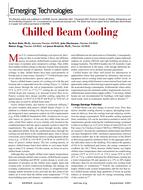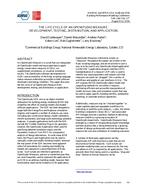Click here to purchase
This paper proposes a machine learning based optimization approach to reduce building total electricity consumption for heating and cooling energy. The proposed approach includes three main steps. Firstly, sampling of base-case building design variables and corresponding simulation results were obtained in EnergyPlus to generate features/labels. As the next step, a Machine Learning (ML) Model based on Support Vector Regression algorithm to predict energy consumption was created. Thirdly, Bayesian optimization was performed on the ML model to determine the optimum values for design variables. A hypothetical office building was used as a case study in order to demonstrate the feasibility of the proposed approach. The results showed that the proposed machine learning based approach is very accurate in estimating the total energy consumption, and easily integrated to any black-box optimization techniques with much less computational cost.
Citation: ASHRAE/IBPSA-USA Bldg Simulation Conf, Sept 2020
Product Details
- Published:
- 2020
- Number of Pages:
- 8
- Units of Measure:
- Dual
- File Size:
- 1 file , 2.7 MB
- Product Code(s):
- D-BSC20-C009


